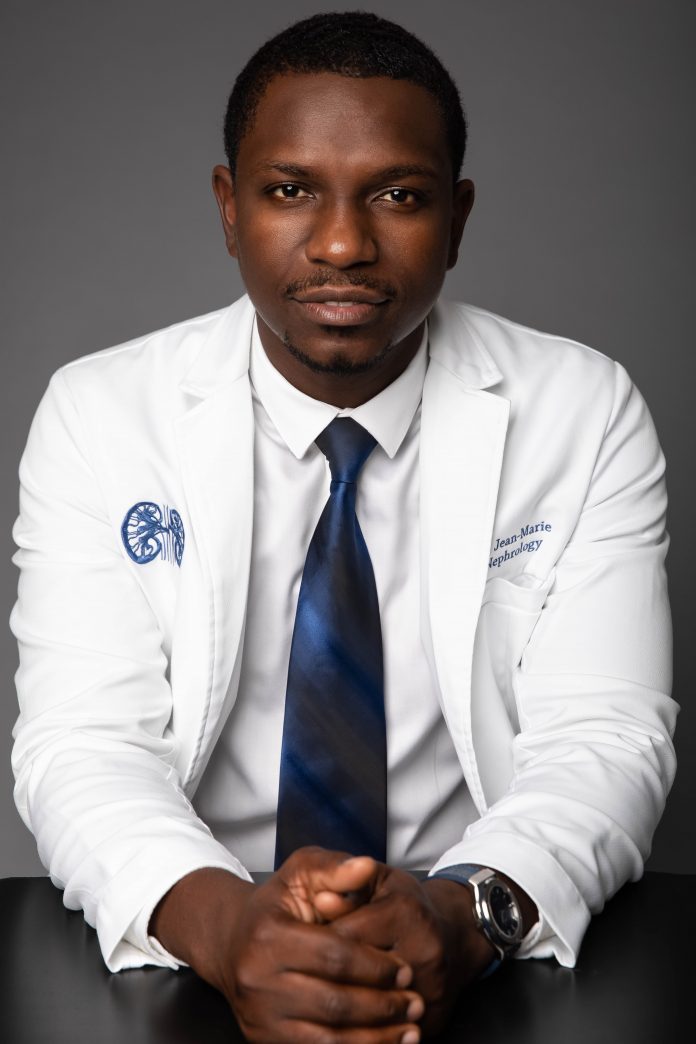Written by: Martine St. Hilaire
Dr. Robenson Jean-Marie’s journey began in the bustling streets of Haiti’s capital, Port-au-Prince, where dreams often collide with harsh realities. His story is one of resilience, determination, and unwavering commitment to healing. Today, as a highly respected nephrologist in Miami, he serves as a beacon of hope for many by transcending borders and inspiring generations.
Born into a humble family, the fourth of his parents’ five children, Dr. Jean-Marie witnessed firsthand the struggles of his community, where access to basic healthcare was often a luxury. Nevertheless, he harbored a deep-seated passion for medicine from a young age. Encouraged by his family’s unwavering support, he pursued his dream to be a doctor with relentless determination. He spent most of his adult life in Haiti and completed medical school at Universite d’etat d’Haiti in 2006. “My siblings and I all had a relationship with medicine, as most of us are nurses or doctors,” he says.
Dr. Jean-Marie’s interest in nephrology was sparked by a tragic event early in his career. In Haiti, between November 1995 and June 1996, while Robenson was in his first year of medical school, 86 Haitian children were fatally poisoned by diethylene glycol (DEG) — normally used in industrial solvents and antifreeze — that had been illegally used as an ingredient in medicinal syrup. Most of the children were five years of age or younger. When consumed, DEG causes severe systemic and neurologic complications including seizures, peripheral neuropathy, and hepatorenal failure.
A medical school professor told Jean-Marie and his peers how easy it would have been to cure all of the children had they been dialyzed in time. Only ten of the 86 children who were poisoned were alive three months after their diagnosis. Nine of them were flown to the US for treatment; nine of them survived, but only one child treated in Haiti lived to tell the tale. Most of the Haitian youngsters didn’t get the timely treatment they needed because dialysis wasn’t easily accessible in the country.
As a curious medical student, Dr. Jean-Marie wanted to understand more about what had happened. During his residency training in New York, he realized kidney problems were plaguing his community. That’s when he decided to specialize in Nephrology.
In high school, Robenson was always an above-average student. He applied for both agronomy and medicine courses, but his heart belonged to medicine. After graduating from medial school 2006, he practiced internal medicine in Haiti. He then applied to medical boards in the United States. During that time, he completed a fellowship in Nephrology at Ohio State University and became the second secretary of the Florida chapter of the Haitian Medical Association.
After settling in Florida in 2015, Dr. Jean-Marie joined a practice in Broward County, but his time there was brief. He realized he couldn’t fully serve his community there. His goals differed from those of the practice. So, in 2016, he opened a practice in North Miami Beach. He couldn’t be happier about choosing this path. “I believe more than 50% of my patients are now Haitians,” he says.
The biggest challenge Dr. Jean-Marie faced when starting his practice was entering the unknown. His community harbors a folkloric mentality that fosters a lack of knowledge within the population — for example, many patients tend to not accept their disease and don’t seek help. When it comes to kidney disease, there are minimal to no symptoms, making it difficult for patients to understand they may be in a dire situation.

Haitians in North Miami make up 40% of the dialysis population but represent less than 15% of the population. “My goal is to properly educate the Haitian populace and teach them that the scope of nephrology goes beyond dialysis,” Dr. Jean-Marie says.
Haitians in North Miami make up 40% of the dialysis population but represent less than 15% of the population. “My goal is to properly educate the Haitian populace and teach them that the scope of nephrology goes beyond dialysis,” Dr. Jean-Marie says. Dialysis is a last resort and represents less than 15% of the nephrology practice. The doctor’s main objectives are to successfully treat kidney disease and hypertension. When necessary, he refers his patients to kidney biopsies and establishes treatment plans to preserve kidney function. He also follows up with patients after their kidney transplants.
The doctor’s main objectives are to successfully treat kidney disease and hypertension.
Today, Dr. Jean-Marie is the only Haitian nephrologist in Miami-Dade County. He’s Chief of Nephrology at Jackson North Medical Center and Medical Director at DaVita Kidney Care. He’s also affiliated with North Shore Medical Center and Aventura Medical Center. He markets his business on the radio and at community events. He urges his executive staff to give a voice to patients and the Haitian community. Without question, his journey from Port-au-Prince to prominence in Florida is a testament to the power of resilience and the transformative potential of education.
Dr. Jean-Marie’s plate is full. He has a wife and two children he’s devoted to and is committed to delivering excellent healthcare to the community. His hobbies include playing soccer, volleyball, dancing, and learning music.
Dr. Robenson Jean Marie, MD
16695 NE 10th Ave, North Miami Beach, FL 33162
Phone: (786) 615-3430

